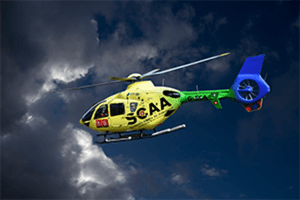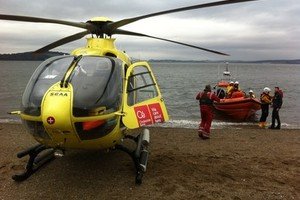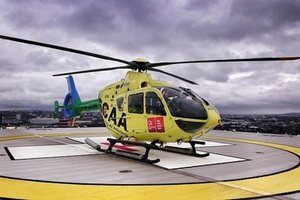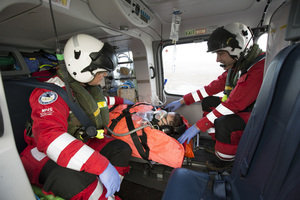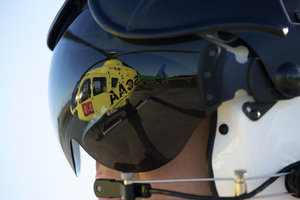
A day in the life of a SCAA paramedic
No two days are ever the same for the crew of Scotland's Charity Air Ambulance's Helimed 79 at Aberdeen.
And that constant sense of expectation is one of the many aspects of life as an aircrew paramedic that convinces Rich Forte he has the best job in the world.
"It's a job that takes you from zero to a hundred in a heartbeat," explained the 34-year-old who has been with SCAA both as a reservist at Perth and then as H79 crew since its launch.
"You can be joking with your team over a coffee but when that bell goes the adrenaline kicks in and your professional self takes over."
And that preparedness for action begins the moment Rich arrives at SCAA's Aberdeen Airport base.
"I usually just shower and go each morning," he explained. "I have a 20 minute drive to work for a 7am start.
"Then it's jump into my instantly recognisable red SCAA flying suit and retrieve all the devices we have on recharge overnight - iPads, radios, defibrillator, suction unit, auto pulse etc. - and load up the aircraft ready for deployment.
"Then it's time to pull the helicopter out from the hangar and on to the apron. By this stage in the morning the airport is buzzing with all the offshore aircraft operations in full swing - it's a noisy workplace."
Aircraft, kit and crew ready, Helimed 79 books on for operations, letting the control desk know that the life-saving team is available for their next emergency mission - anywhere in Scotland.
Rich insists on a fresh cafetière of quality coffee to accompany him in to the morning briefing where the crew discuss weather, no fly areas, other scheduled aircraft activity, possible hazards and obstructions that could all impact on SCAA's operations.
"We then run through an aircraft emergency scenario - such as an engine fire - to hone our skills and procedures so that we can avoid any 'startle effect' if the worst happens. We do a different scenario each day and it keeps us fresh and alert to all possibilities."
At around 8am each day, crew from the Emergency Medical Retrieval Service join SCAA for another briefing in preparedness for any joint tasking or training that day. Joint training tackles critical care procedures for a variety of mission scenarios.
Breakfast follows and Rich proves the "foodie" of the H79 crew.
"I do love a bit of sourdough, eggs and avocado," he revealed, "and my carrot cake porridge is legendary!"
Although there are set things to attend to at base each day such as kit checks, training and paperwork, everything stops when a job comes in.
Then, like a well-oiled machine, the crew quickly gather all information about the incident and the casualty they can while flight plans are worked out, communication networks determined, grid references and patient condition logged and other resources on scene or summoned relayed.
"Each paramedic has specific roles in the aircraft," explained Rich. "If you're front seat, you have a co-pilot role helping with pre-flight checks and navigation duties. In the back, you're communicating with the talk group getting updates on the scene and the patient.
"It's pretty full on but training just kicks in and we're airborne within five minutes, with Aberdeen Airport giving us precedence over other aircraft movement to exit the airport on an emergency call out."
Every mission is different - be it road traffic collisions, falls, heart attacks, industrial accidents, sporting injuries or a myriad of other time-critical emergencies which have prompted Helimed 79 to respond during its first year.
"And each patient is different - from babies to the elderly," said Rich. "I like to think we take very great care of them both at the scene and in flight to hospital - the way we would like someone else to treat and care for our loved ones."
On return to base, kit has to be cleaned, tidied and restocked ready for the next shout. Particularly difficult or stressful jobs sees the crew help each other unwind and talk through any issues or emotions.
"Sometimes we get a chance to debrief, grab some food and stage a training session," said Rich. "Other times we have barely boiled the kettle than we're off again.
"Yes it can get exhausting. You're dealing with the most critical emergencies," he said. "Really serious illness or injury. You're also part of a helicopter crew with all the demands that brings and flying itself saps your energy.
"After two jobs you can be left pretty exhausted - both physically and mentally. But we’re there if needed for a third or a fourth job. Whatever it takes.”
The paramedic's day draws to a close when the aircraft is back in the hangar, appliances are recharging and the aircraft has signed off.
"Then it's into the car, music turned up loud and back to being a husband and a dad for the rest of the evening," said Rich. "Early to bed and up the next morning to do it all again.
"We're all passionate about the charity and our work," he said. "There is no more rewarding job than working to save and improve lives and help those most in need while flying a helicopter though some of the most spectacular scenery in the UK,
"It's hugely rewarding - it's the best job in the world."
If you value the work we do, and have the means to support us, please consider donating to our 8th birthday appeal. Many thanks for your support.

